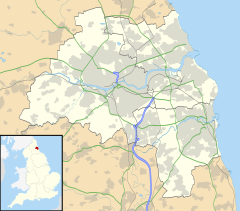Port of Sunderland
| Sunderland | |
|---|---|
 Clockwise, from top: Echo 24 and the Wearmouth Bridge, Roker Lighthouse, the National Glass Centre, Sunderland Museum and Winter Gardens, Fulwell Mill and Penshaw Monument |
|
| Sunderland shown within Tyne and Wear | |
| Population | 174,286 (2011 Census) |
| Demonym | Mackem |
| OS grid reference | NZ395575 |
| • London | 240 mi (387 km) SSE |
| Metropolitan borough | |
| Metropolitan county | |
| Region | |
| Country | England |
| Sovereign state | United Kingdom |
| Post town | SUNDERLAND |
| Postcode district | SR1, SR2, SR3, SR4, SR5, SR6, SR9 |
| Dialling code | 0191 |
| Police | Northumbria |
| Fire | Tyne and Wear |
| Ambulance | North East |
| EU Parliament | North East England |
| UK Parliament | |
Sunderland (/ˈsʌndərlənd/, locally /ˈsʊndlən/) is a city at the centre of the City of Sunderland metropolitan borough, in Tyne and Wear, North East England. It is a coastal city at the mouth of the River Wear with adjoining beaches of Roker, Seaburn and Whitburn. The etymology of Sunderland is derived from "Sundered-land" with the river travelling through the city as opposed to sitting "upon" the river.
Historically in County Durham, there were three original settlements on the site of modern-day Sunderland. On the north side of the river, Monkwearmouth was settled in 674 when Benedict Biscop founded the Monkwearmouth–Jarrow Abbey. Opposite the monastery on the south bank, Bishopwearmouth was founded in 930. A small fishing village called Sunderland, located toward the mouth of the river (modern day East End) was granted a charter in 1179.
Over the centuries, Sunderland grew as a port, trading coal and salt. Ships began to be built on the river in the 14th century. By the 19th century, the port of Sunderland had grown to absorb Bishopwearmouth and Monkwearmouth. More recently, Sunderland has seen growth as a commercial centre for the automotive industry, science & technology and the service sector.
...
Wikipedia

